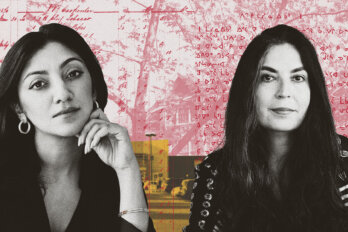Midway through Ghalib Islam’s debut novel, Fire in the Unnameable Country, a woman under government interrogation confusedly recounts an event that she and her husband, Zachariah, once witnessed: “It was apocryphal, she said, he told it several ways, forgot parts, filled in gaps, restated the beginning three times, then Zachariah told it again to me as if I wasn’t there, and I remembered it back to him later and it was different.” She could be describing Islam’s book itself, in which a man named Hedayat, the woman’s grandson and the novel’s narrator, describes the history of his family and his nation with little regard for coherence or linearity. Like his grandmother, he is an unreliable storyteller.
The plot, such as it is, is hopelessly tangled, lost in language and fuzzy around the edges. Hedayat’s mind is an expanding universe, and, as the opening line has it, “The universe is shaking.” There are terrorist attacks, bloodthirsty ghosts, and underground cells of politicized animals; Hedayat himself gradually becomes an owl. This tendency toward magic without realism is what makes Fire in the Unnameable Country so dizzyingly good. Parsing the exploded, fragmentary story of Hedayat’s ancestors is a vertiginous thrill.
If the novel sounds difficult to follow, that is the point. Wandering ceaselessly, with the city erecting itself around him as a reflection of his thoughts, Hedayat brings to mind the great flâneurs of Virginia Woolf and James Joyce—but unlike Clarissa Dalloway or Leopold Bloom, he is a citizen of an unreal place. His homeland, the titular innominate country, always represents something else, to both the book’s characters and the reader. In the novel, Hollywood has taken over the nation’s capital, turning it into the setting for the longest film ever made, The Mirror. Like Egypt’s Alexandria, La Maga is a new city built on an old one, the difference being that modern La Maga is a metropolis dressed for reality television: “Inestimable mirror-walls travelled in coffin boxes throughout the city, and with the addition of smoke and light and the incessant camera gaze, the locals forgot the feeling of living real lives.”
For the reader, in turn, Hedayat’s country serves as an obvious simulacrum of the Middle East and South Asia, created through a hodgepodge of Indo-Arabian antiquity and recent history. Islam, a Canadian born in Bangladesh, opens with a scene borrowed from the oldest palimpsest of Asian folklore, One Thousand and One Nights. Then he tunnels back and forth from the colonial era to the present day, when the country’s tyrannical government has gained the ability to record people’s very thoughts on reels of tape, stored in a ministry full of maladroit paper-pushers. This turn toward surveillance accompanies a jolting realization: Islam’s mythical Eastern mirage is not so different from the modern Western world. The national security apparatus of this unnameable country, like that of a more familiar territory, uses the spectre of terrorism to violate the privacy of its thinking citizens.
Language is the vehicle of thought, and thinking is dangerous—but to whom? In December of last year, 500 writers, including five Nobel laureates, signed a petition urging the UN to establish an international law preventing the abuse of digital surveillance technology. “A person under surveillance is no longer free; a society under surveillance is no longer a democracy,” they wrote. In the wake of Edward Snowden’s revelations about the American National Security Agency, the privacy and liberty of language—our ability to make a phone call or send an email without fear of government eavesdropping—has become an even more pressing concern.
In 1946, George Orwell published “Politics and the English Language,” an essay on the role language plays in thinking. He argued that thinking forms the basis of political freedom, and his screed made the case for resistance. He was particularly aghast at the invasion of clichés into public discourse, and he perceived such metaphors as “toe the line” and “stand shoulder to shoulder” as an assault on liberty: “Every such phrase anaesthetizes a portion of one’s brain.” To guard our capacity for dissent, he insisted, we must always use language in ways that enable new thinking.
Many of the ideas Orwell outlined in “Politics and the English Language” returned in his classic novel 1984, in which a technocratic dictatorship stifles rebellion simply by eliminating words: 1984’s Newspeak (“crimethink,” “unperson”) alters not just the sound but the grammar of daily life. To kill language, the form that enables thinking, is to kill freedom.
Unlike 1984, or the dystopias of recent novels like Gary Shteyngart’s Super Sad True Love Story and Dave Eggers’ The Circle, Islam’s take on our increasingly mediated minds pays little attention to the technologies of surveillance. Still, Islam shares Orwell’s concern for language, turning his attention to what it means to speak as a person living under diffuse forms of scrutiny.
Life in the unnameable country has made Hedayat linguistically ill. He and his ancestors suffer from various forms of glossolalia, or speaking in tongues. In Hedayat’s case, this affliction manifests itself through acceleration, and he tells his story in a language bent on revealing its own artifice; he breaks the rules of syntax, dips into verse, and occasionally eschews punctuation. He interjects with digressions on top of tangents, asking the reader to recall a thread he may have previously, in his need to spill out the words, rushed over. He spouts breathless, Newspeak-esque portmanteaus (“I inhaled the dust, a thoughtmetal taste in my mouth”; “Motherengland”), but to the opposite effect of Orwell’s. Instead of obfuscating complexity, this glossolaliac prose celebrates it. In speeding up language to the pace of thought, Islam allows his narrator total liberty of both mind and expression. Language in this family epic is, to crib a phrase from the modernist writer Djuna Barnes, “an infected carrier of the past.”
Indeed, Fire in the Unnameable Country represents a vigorous reinterpretation of modernism, the early twentieth-century literary movement that turned language inside out. Writers such as Barnes felt that prior literary forms, in insisting on clarity, failed to convey the irrationality of human existence. In response, they created works that eschewed realism and embraced stream-of-consciousness narrative. Through his self-consciously capricious approach to plot and his playful, shifting use of language, Islam revisits these modernist preoccupations—albeit in a surreal, ultra-contemporary context.
Much of Fire in the Unnameable Country pays clear homage to one modernist in particular. Although Hedayat’s glossolalia recalls the poetic frenzy of European novels like Woolf’s Mrs. Dalloway and Joyce’s Ulysses, the narrator takes his name from the Iranian writer Sadegh Hedayat. By introducing his country to the latest Western literary and philosophical ideas, Hedayat revolutionized Iranian letters, despite the fact that he first published his influential 1937 novel The Blind Owl in India, and insisted that it not be made available in Iran for fear of the authorities. The book was only serialized in his homeland after Reza Shah’s abdication in 1941, and it has since been periodically banned or censored. Fire in the Unnameable Country makes sly allusions to the legacy of The Blind Owl, whose nameless protagonist, like Islam’s Hedayat, suffers from manic illnesses (he relates his story to a shadow he mistakes for an owl) and blends cosmopolitan referents to create a non-place.
One of modernism’s great innovations was to capture the messiness of the human thought process, and critics have called The Blind Owl an exercise in psycho-fiction, its dark themes and unsettling images mirroring the circuitry of a lonely, despairing mind. Although Islam’s Hedayat—a human turned into an owl—is similarly unmoored, his sense of alienation is mitigated by twenty-first-century reality: surrounded by thought collectors and cameras, he is never truly alone. No longer content to listen to the ramblings of an insane man, this owl speaks voluminously about the crazy world he inhabits, overwhelming the cameras and the recorders (and occasionally the reader) with an effusion of consciousness. He is a modernist subject in a postmodern world, and Islam’s stylish appropriation of the form transforms it into something new.
Where Newspeak depicted the horrors of degraded language and modernism sought to better reflect the way we think and speak, Islam’s vibrating prose points to a strategy of resistance. When the authorities are listening to your every word, a frenzied, even contradictory story carves out space for privacy. Hedayat’s tale of one family and one nation is cut up and rejigged, and it reflects what thinking feels like under the immense pressure of surveillance. If language is endangered because we are being watched, then Fire in the Unnameable Country, in the spirit of its antecedents, proposes a dissenting grammar.
This appeared in the March 2014 issue.





